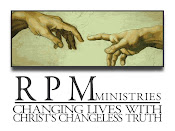 As I study more deeply the theory and practice of biblical counseling, I find much material has already been produced that articulates the inner struggle bulimics deal with daily - how to fight and win against temptation. This battle is certainly not unique in any way to eating disordered individuals; all sin follows a similar pattern until, unchecked, it becomes a life-dominating problem.
As I study more deeply the theory and practice of biblical counseling, I find much material has already been produced that articulates the inner struggle bulimics deal with daily - how to fight and win against temptation. This battle is certainly not unique in any way to eating disordered individuals; all sin follows a similar pattern until, unchecked, it becomes a life-dominating problem.In one of his books, Dr. Stuart Scott, the Associate Professor of Biblical Counseling at Southern Baptist Theological Seminary lays out practical steps that deal with the heart-issue of sin (in this case, he's writing about lust, but you can easily see how the principle applies to bulimia and binge eating). I would like to quote part of what he says, and ask you to consider prayerfully how you may "F.L.E.E."
"The first step to overcoming your sin problem is to admit that you have one. The second thing you must do is to take full responsibility for it. No one else has caused this problem - Not God or anyone who has influenced you. Your sinful heart has chosen to take whatever opportunities you were given because your heart (without God) is utterly wicked. You must be brutally honest with yourself in order to begin on the path of righteousness."
To paraphrase the next section and make it applicable to those with food addictions, it is noted that BEFORE temptation hits again you confess your sin (in this case, bulimia) to God and any others you may have sinned against in the process. (Think of all the times you have lied to cover up your secret; stolen food; etc.) "Explain your willingness to give yourself fully to repentance (putting off your sin and putting on what is right). Then ask for forgiveness (Psalm 51:1-4; Matt. 5:23-24)."
"Daily, even several times a day, ask God to work in this area of your life and help you to put forth effort toward change (2 Corinthians 9:8)."
Dr. Scott then lists several other practical suggestions, including regular Bible study and making lists of righteous thoughts to "put on" when temptation hits in order to cultivate godliness through discipline (I hope soon to do an entire series on that subject).
Here is his helpful exhortation - At the time of temptation: (F.L.E.E. from sin to God).
1. Flee! Act quickly to run away from sin. Acknowledge your complete allegiance to God and put on loving thoughts and actions. Get out of or vary the situation immediately (2 Timothy 2:22).
2. Lean on God. Call on Him for strength to honor Him. Draw near to God and He will draw near to you (Psalm 37:5; James 4:8).
3. Entertain the right thoughts (Philippians 4:8-9). Rehearse those things for which you are grateful and thankful.
4. Eagerly continue to pursue love and righteousness. Don't look back. Look to your "ways to love and serve" lists for ideas if necessary. Engage yourself in giving (Proverbs 21:21).
Finally, if you fail -
"Do not engage in panic, self-pity, or giving up! These attitudes are just what Satan is hoping for, but this is not acceptable to God because it is not in keeping with true repentance, and it will not get you anywhere! Get up and get back on the path to victory if you are still serious about repentance. You probably will not be flawless in putting off old habits. It takes time to change. It is a serious matter to choose to sin, but all is not lost if you return to a righteous path and refuse to give up (Proverbs 24:16)." 1 Big, fat "Amen". All of the points he makes above (again, in context he is talking about sexual lust, but clearly they are equally applicable to ALL "lusts of the flesh") proved true for me while I was repenting of my 2-decade battle with bulimia.
Let me know if you are at all helped or blessed by this.
1 All quotes taken from "The Exemplary Husband" by Dr. Stuart Scott, Focus Publishing, Bemidji, MN (c) 2002. Excerpted from pp. 292; 294; 296.















